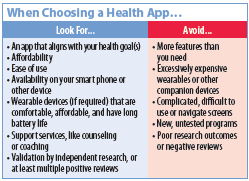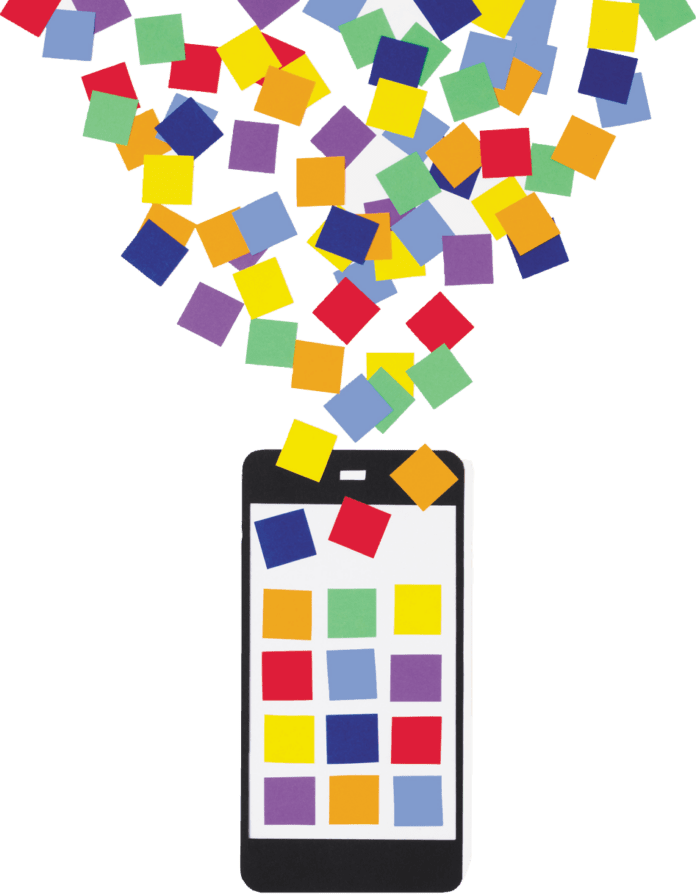The global market for applications (apps) and devices that track and monitor your lifestyle—from calorie, nutrient, and food intake to daily steps, sleep, water intake, and heart rate—is expected to reach more than 105 billion U.S. dollars by 2030. While the research on whether health apps can help us achieve long term results is still emerging, there are definite advantages to tools that help people focus on their lifestyle behaviors.
Why the Appeal? Whether they are software applications for mobile phones, wearables, sensors, or Web-based tools “health apps provide an avenue for self-improvement,” says Sai Krupa Das, PhD, an associate professor at Tufts’ Friedman School of Nutrition Science and Policy. “They are instantly available, most are customizable to individual needs, and they provide immediate access to one’s data. They give individuals the ability to self-monitor.”
In addition to popular weight loss and fitness apps, there are apps for most every health category, including tracking sleep hours, having guided meditation at your fingertips, and keeping track of your heart rate. Some apps are specific to one category, but there are many that integrate multiple features.
Options for coaching or contact with an expert may be available. “Integrating data collection with expert coaching is ideal for encouraging behavior change,” says Das. While research is still limited, some studies have shown that health apps that offer brief counseling sessions increase participants’ physical activity.
Challenges. Anything that helps people focus on healthy behaviors is a plus, but not all tracking algorithms provide accurate data. Some calorie inputs use crowd-sourced calorie content of meals, which can be misleading. Some apps depend on the user estimating all the foods and beverages they consume, including serving sizes. “If it’s not accurate, it won’t provide useful information,” says Das.
Also, just because you have an app doesn’t mean you’ll use it. Many apps require daily input of information that may get tiresome. Additionally, the watches, bands, or rings that need to be purchased for use with some apps can be prohibitively expensive.

Choosing a Health App. Before choosing a health app, you need to set your personal health goals. It’s also important to assess your ability to use the technology. A less tech-savvy person may have trouble correctly using apps and wearable devices. If the platform is not intuitive and easy to use, success is less likely. “It should be simple,” says Das, “and there should be no constraints to accessing your own data—if it’s not accessible, it can’t help you.”
The data the app provides should be actionable. Consider an app with the option to access experts, such as trained coaches, registered dietitians, or other healthcare providers (these services often come at added cost). Some apps connect you to other users to encourage accountability and interest and to make the experience more competitive or fun—which may increase your adherence. User feedback and expert reviews may be helpful when deciding if an app Consider these tips when choosing a health app or device: Know Your Goals. Choose a health app that includes features that align with your specific health goals. Get Support. Share self-monitoring data with your doctor, coach, or nutritionist, as well as peers like family and friends; and consider an app that gives you access to reputable support services or trained experts. Keep it Simple. The easier the app is to use, the more likely you will use it and stay on the path toward your goals. Shop Smart. Do your research on an app or device before you buy. Make sure it has been tested (preferably by someone other than the company) and shown good results.
New technologies may help you take control of improving your health. At the same time, many of these tools have their limitations in accuracy, accessibility, and cost. But a good app can provide feedback in real time and can potentially lead to positive behavior change.
























